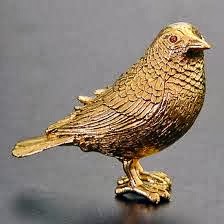These days when the entire nation is witnessing the vote bank politics. All we listen in the television news is about polls, the 49% women voters, the youth making choices and the country demanding a change – the positive one! On one such day, there was a debate on television where 2 panelists argued on the phrase ‘India – the then Sone ki Chidiya’ and I found that the phrase echoed in my mind for little longer than the usual.
Something was disturbing me and I realised that my mind wanted to go back to the history. There was a time our country was called ‘Sone ki Chidiya’ (The Golden Sparrow). This is something we all are proud of. I always wondered how did India get this name ‘Sone ki Chidiya’ and not ‘Iron Eagle’. Who named India, ’the Golden Sparrow’? How did it all start? I hope you are also curious to know the story. So here is the story:
India was invaded by many. The first time someone invaded India was Alexander the great. He crossed into India in 327 B.C.E. fought against King Porus. King Porus fought fiercely but was defeated. Alexander wanted to move further towards Magdha, the strongest of Indian empires. But his army refused to go further as they had heard the tales of powerful Indian tribes and they had not forgotten memories of their battle with King Porus. Alexander was extremely disappointed but accepted the decision of his army and decided to return to his capital.
Post Alexander departed from India, close to next 1300 years were relatively peaceful and India didn’t suffer any major invasion. Starting 1000 A.D. Mahmud of Ghazni, an Afghan, invaded India several times. He plundered several temples and killed hundreds of thousands of Indians. The booty which he looted is estimated to be more than 100 million Dirhams, several tons of gold, silver and precious gems.
While Mahmud of Ghazni was returning to his capital in Afghanistan, one of his generals asked Mahmud Ghazni about why Indians were not showing any resistance and were fleeing from the battle field without caring about their country, their families, savings and whatever they had. Mahmud of Ghazni reminded his general of a game they played in their childhood. They had eagles as their pets and their favorite past time was to watch their eagles fight. In order to make them fight, they used to throw a sparrow in the sky and before it can fly away, their eagles will chase, kill and eat the sparrow. Whosoever’s eagle killed the sparrow, was the winner.
Listening this, his general laughed and told Mahmud of Ghazni that they are still playing the same game in India and the only difference is that they are the eagles and the Indians are the sparrows. Listening this Mahmud of Ghazni answered, “Yes! We are eagles and they are the sparrows.. But they are the Golden Sparrows!”
This is how India got another name, “The Golden Sparrow- Sone ki Chidiya” as Indians didn’t stand united to face the threats and invaders not only defeated the Indians but also took away the resources.
And today when I think about this story again, I wonder what would have been our country like if only, “the Maharajas, Kings, Dewans and then landlords during those times chose to show some resistance and fight instead of giving up to their own fancies, India would never have been called ‘Sone Ki Chidiya’. If we go by the facts in the story there doesn’t seems a single reason to feel proud.

Digging deep into the context and trying to find out – how this could have been saved, I got the following answers from within and these are certainly the lessons learnt.
Points to Ponder:
Escapism: Running away from a problem is not an option instead we should understand, explore, find the solution and then act responsibly. An escapist attitude is never appreciated in any sphere of life – corporate or life in general. We come across many difficult situations but only those who face them patiently sail & survive. Escapism is a complete no in our lives, as emotions may sometime help us in life but here – results matter most. And those who care for results, choose to act.
Team Work: No Indian king made any attempt to make a coalition to face the external threats. Had they formed a coalition and challenged Mahmud of Ghazni and other invaders, the story could have been totally different.
Attentiveness and Action: As they say, the more you sweat during peace the less you bleed during war. One should always be ready and keep all the options open. During peace don’t stop practicing war. However, sometimes there is nothing wrong in buying time, if there is a grave threat to your existence because of the challenge in hand or a corporate situation is disturbing your work-life balance, one must buy some time, assess the possibilities and act accordingly. But mind you, taking too much time is not recommended.
Take risks: Don’t keep waiting for the best time. The go-getters believe in ‘now’. This also comes from an independent & leaders attitude. Those people Take Risk > Lead> Confront> Solve.
Experiment: Learn from others mistakes. When Indian kings were losing one by one, no one learnt the lessons and rectify their strategies to confront the Mahmud of Ghazni. Experiential Learning is life long, it offers a different point of view to handle situations, people and circumstances. It is the way of learning during the pressure situations. It is supposedly the only way to come out of those situations. One should rather not get trapped and act smartly.
This was my interpretation of story for my corporate trainees who each day go out of home to add some more meaning to life. Stay tuned for more stories. Take Care
